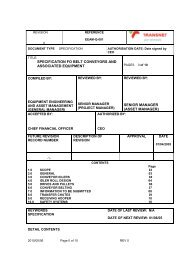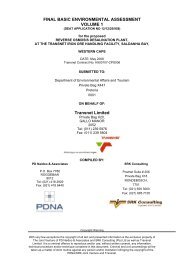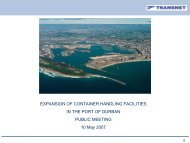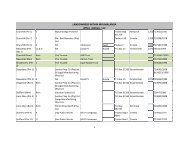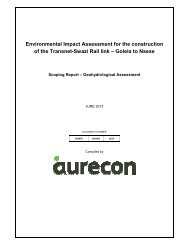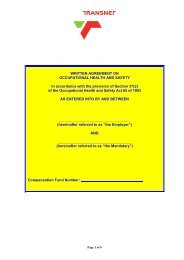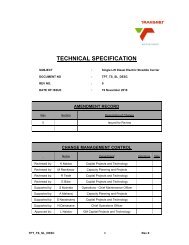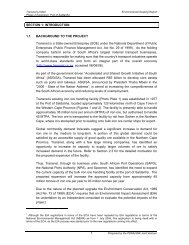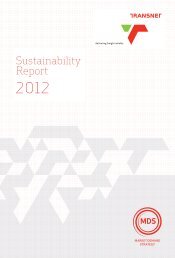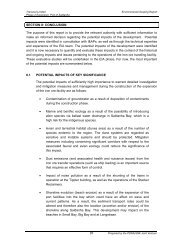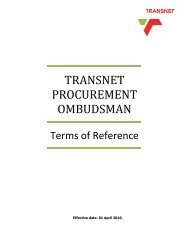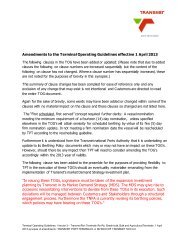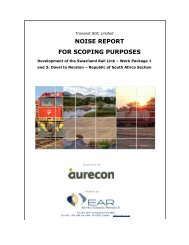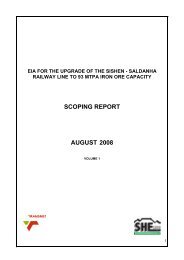Version1: Applicable from 1 April 2011 - Transnet
Version1: Applicable from 1 April 2011 - Transnet
Version1: Applicable from 1 April 2011 - Transnet
Create successful ePaper yourself
Turn your PDF publications into a flip-book with our unique Google optimized e-Paper software.
4.2.2. Should a berth not be readily available for the late vessel, the default position will be<br />
re-scheduled by the CPO on the basis of a five (5) day firm notice as defined in<br />
clause 1.1.68.<br />
5. DELAYS TO VESSELS ON BERTH<br />
Delays of a vessel on a berth in any of the circumstances contemplated in clause 5.1 below<br />
for more than four (4) hours will be dealt with as follows:<br />
5.1. Delays caused by the vessel, its cargo, and /or its representative<br />
5.1.1. Where a vessel has berthed and it is not ready to load within two (2) hours of such<br />
berthing, or if it needs to further clean, prepare, survey and/ or examine hatches<br />
before being able to load or is waiting on cargo, TPT, may after a delay of four (4)<br />
hours, in its discretion, order the vessel off the berth and all costs and expenses<br />
incurred thereby shall be for the account of the vessel. The vessel must ensure that<br />
it vacates the berth within two (2) hours of having been instructed by the CPO to do<br />
so; notwithstanding that such a movement may result in the vessel being moved as<br />
a dead ship. Failure to comply with such request will result in TPT requesting the<br />
TNPA to move the vessel forthwith. All costs and expenses thus incurred shall be for<br />
the account of the vessel.<br />
5.1.2. A vessel as contemplated in Clause 5.1.1 which has spent time alongside any berth<br />
will attract stand-by charges at the applicable rate after four (4) hours. Should the<br />
vessel be instructed to vacate the berth as a result of it being deemed unproductive,<br />
stand-by charges will be payable <strong>from</strong> the commencement of the planned shift,<br />
including the two (2) hour grace period referred to in Clause 5.1.3 below. Stand-by<br />
charges will not apply in instances where resources were not booked.<br />
5.1.3. A maximum of two (2) hours per vessel is allowed for hatch surveying and preparing<br />
hatches whereafter stand-by charges relating to such delay will apply. Stand-by<br />
charges will not be raised should the cargo not be load ready as a result of the fault<br />
of TPT.<br />
5.1.4. Vessel delays (and performance), recorded per hatch, will be measured to obtain a<br />
net result of the terminal/vessel performance. The objective is to identify and reduce<br />
all avoidable delays and to plan for improvement and such plans must be discussed<br />
at Phase IV.<br />
5.1.5. TPT does not accept responsibility or liability for any cost/demurrage incurred by a<br />
vessel as a result of the non-delivery of cargo by road or rail to any terminal or<br />
arising <strong>from</strong> any delay occasioned, whether by the delayed departure of the vessel<br />
concerned for any reason whatsoever <strong>from</strong> any other port, or otherwise.<br />
Terminal Operating Guidelines: Version 3 – <strong>Transnet</strong> Port Terminals Ro-Ro, Break-bulk, Bulk and Agricultural Terminals: 1 <strong>April</strong> 2013<br />
TRANSNET PORT TERMINALS, A DIVISION OF TRANSNET SOC Ltd 24



